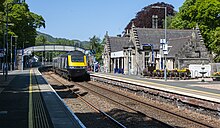Pitlochry railway station
 | |||||
| General information | |||||
| Location | Pitlochry, Perth and Kinross Scotland | ||||
| Coordinates | 56°42′08″N 3°44′07″W / 56.7023°N 3.7353°W | ||||
| Grid reference | NN938580 | ||||
| Managed by | ScotRail | ||||
| Platforms | 2 | ||||
| Other information | |||||
| Station code | PIT[2] | ||||
| Key dates | |||||
| 1863 | Opened | ||||
| Passengers | |||||
| 2019/20 | |||||
| 2020/21 | |||||
| 2021/22 | |||||
| 2022/23 | |||||
| 2023/24 | |||||
Listed Building – Category A | |||||
| Designated | 12 October 1994 | ||||
| Reference no. | LB39867[3] | ||||
| |||||
Pitlochry railway station is a railway station serving the town of Pitlochry in Perth and Kinross, Scotland. It is managed by ScotRail and is located on the Highland main line, 28 miles 21 chains (45.5 km) from Perth, between Dunkeld & Birnham and Blair Atholl.[4]
History
[edit]The station is situated on the former Inverness and Perth Junction Railway (I&PJR) and was opened along with the line in 1863.[5] In 1865, The I&PJR amalgamated with other railways to create the Highland Railway.[6]
In 1897 the building on the north-bound platform was replaced with a more substantial building. The main block on the south-bound platform received an addition in order to extend the booking office and the stationmaster’s rooms.[7]
Facilities
[edit]There are waiting rooms on both platforms, benches and help points on both platforms, with a small car park, ticket office and toilets available on platform 1. Access to both platforms is step-free (from the car park for platform 1 and a drop-off point for platform 2), but the only way of crossing over is via the footbridge.[8] There is a staffed ticket office open throughout the day, however, there are no self-service ticket machines.[9]
Platform layout
[edit]
The station has a passing loop 25 chains (500 m) long, with two side platforms. Platform 1 on the southbound line could accommodate trains having eight coaches, whereas platform 2 on the northbound line could hold eleven.[10] Both platforms were extended in March 2019 as part of a £57 million upgrade programme by Network Rail, which also saw the station re-signalled.[11]
Services
[edit]In 2022, all Highland main line services between Perth and Inverness call here. From Monday to Saturday, there are five trains each weekday to Edinburgh Waverley (including the Highland Chieftain to London King's Cross) and seven to Glasgow Queen Street southbound, plus the overnight sleeper to London Euston (the latter does not run southbound on Saturday nights or northbound on Sundays). Northbound there are eleven departures to Inverness.
On Sundays there are five trains to Edinburgh (including the King's Cross service) and two to Glasgow (plus the Caledonian Sleeper), along with seven to Inverness, two of which extend to Elgin.[12]
| Preceding station | Following station | |||
|---|---|---|---|---|
| Dunkeld & Birnam or Perth |
London North Eastern Railway East Coast Main Line |
Blair Atholl or Kingussie | ||
| Dunkeld & Birnam or Perth |
ScotRail Highland Line |
Blair Atholl or Dalwhinnie or Newtonmore or Kingussie | ||
| Dunkeld & Birnam | Caledonian Sleeper Highland Caledonian Sleeper |
Blair Atholl | ||
| Historical railways | ||||
| Ballinluig Line open; station closed |
Highland Railway Inverness and Perth Junction Railway |
Killiecrankie Line open; station closed | ||
Future proposals
[edit]In the future,[when?] this station will be one of those to benefit from a package of timetable enhancements introduced by Transport Scotland and Scotrail. The current Perth to Inverness timetable will increase to hourly each way, with trains south of there running on alternate hours to Edinburgh and Glasgow. Journey times will be reduced by 10 minutes to both cities.[13] As of May 2022, this has still not taken place.[12]
See also
[edit]References
[edit]- ^ Brailsford, Martyn, ed. (December 2017) [1987]. "Gaelic/English Station Index". Railway Track Diagrams 1: Scotland & Isle of Man (6th ed.). Frome: Trackmaps. ISBN 978-0-9549866-9-8.
- ^ Deaves, Phil. "Railway Codes". railwaycodes.org.uk. Retrieved 27 September 2022.
- ^ Historic Environment Scotland. "Station Road, Pitlochry Station, including Down Platform Building, Footbridge, Fountain and Signal Box (LB39867)". Retrieved 7 July 2020.
- ^ Bridge, Mike, ed. (2017). TRACKatlas of Mainland Britain: A Comprehensive Geographic Atlas Showing the Rail Network of Great Britain (3rd ed.). Sheffield: Platform 5 Publishing Ltd. p. 93. ISBN 978-1909431-26-3.
- ^ Vallance, H. A. (1985) [1938]. The Highland Railway (4 ed.). Newton Abbot: David St. John Thomas. p. 25. ISBN 0946537232.
- ^ Grant, Donald J. (2017). Directory of the Railway Companies of Great Britain. Troubadour. p. 265. ISBN 9781788037686.
- ^ "Station Improvements". Dundee Advertiser. Scotland. 26 March 1897. Retrieved 3 September 2023 – via British Newspaper Archive.
- ^ "National Rail Enquiries -". www.nationalrail.co.uk. Retrieved 14 April 2022.
- ^ "Pitlochry Station | National Rail". nationalrail.co.uk. Retrieved 5 June 2023.
- ^ Brailsford 2017, map 19B.
- ^ Glen, Louise (27 March 2019). "More trains, quicker journey times and improved station lengths all part of Highland railway improvements". The Press and Journal. Retrieved 21 May 2020.
- ^ a b eNRT May 2022 Edition, Table 213
- ^ "‘Rail revolution’ means 200 more services and 20,000 more seats for Scots passengers" Archived 20 August 2016 at the Wayback MachineTransport Scotland press release 15 March 2016; Retrieved 18 August 2016
External links
[edit]- Train times and station information for Pitlochry railway station from National Rail
- Railway stations in Perth and Kinross
- Former Highland Railway stations
- Railway stations in Great Britain opened in 1863
- Railway stations served by ScotRail
- Railway stations served by Caledonian Sleeper
- Railway stations served by London North Eastern Railway
- Category A listed buildings in Perth and Kinross
- Buildings and structures in Pitlochry
